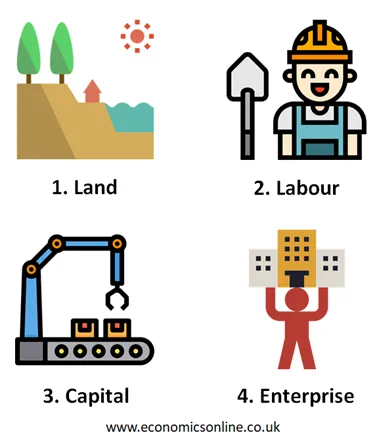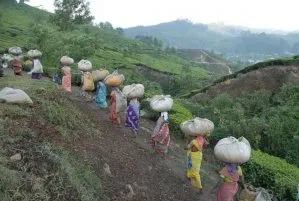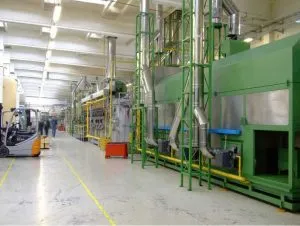
Image showing smoke from factories.
Factors of Production: Definitions, Examples and Importance
Factors of Production
The resources or inputs needed by firms for the production of goods services are called the factors of production.
Production means the process of converting inputs (FOPs) into outputs (goods and services).

Factors of Production or resources are limited or scarce. In economics, this concept is called scarcity of resources. Production processes cannot take place in the absence of factors of production.
There are four factors of production which are land, labour, capital and enterprise. Economists consider labour as the human effort provided by employees

Land
All natural resources used in producing goods and services are called land. Land does not mean a piece of land only. It means all the natural resources on, above or below the surface of the earth.
Examples of Land
This factor of production includes a wide range of things such as raw materials, mineral deposits like oil and coal, natural gas, the earth's rivers and lakes, the surface of the earth land itself, fish, trees, fruits, agricultural land and all other things made by nature.
Labour
The physical and mental services provided by workers are called labour. Economists consider labour as the human effort provided by employees in producing goods and services. It is the second factor of production.
Note that workers are not labour. The mental and physical services provided by workers are called labour. The basic determinant of labour is the nation's population. Robots are not considered labour because they are not human beings.
Human capital is a feature of labour which means the knowledge, skills, training and experience of workers which are used in producing goods and services. The more the human capital, the more productive workers will be. It is the quality of labour used in production.
Examples of Labour
Human effort provided by full-time, part-time, permanent and temporary workers including managerial staff.
Capital
All man-made resources used in producing goods and services are called capital. It is the third factor of production. Capital is a type of physical resource including anything that can be regarded as made by humans to aid production. Capital means physical capital or capital goods and not financial capital. So, cash is not a physical capital as it is not productive. Robots are considered as capital, not labour. As a factor of production, 'capital' means physical capital which helps in producing more resources by firms and governments.
Examples of Capital
Capital covers a wide range of items such as factories, office blocks, machinery, trucks, computers, information technology, transport vehicles and infrastructure in the form of roads, railways, pipelines, electricity supplies, water supplies and so on.
Enterprise
The ability of a person to take financial risk and organise other factors of production (land, labour and capital) into a unit capable of producing goods and services is called enterprise. It is the fourth factor of production. The person having this ability is called an entrepreneur. As a factor of production, the enterprise has two main functions. The first function of the enterprise is to take the financial risk by making investment in the business. The second function of enterprise is to organise other three factors of production to produce goods and services.
Some firms are small with few resources. The functions of the enterprise are undertaken by a single individual, the entrepreneur. In larger, more complex firms the functions are divided, with salaried managers organising the other factors and shareholders taking the risk.
An entrepreneur is an individual who seeks new business opportunities and who takes the financial risk of starting and managing a new business.
Examples of Enterprise
Enterprise is the skill possessed by Entrepreneurs. Well-known entrepreneurs include Richard Branson (Virgin Group), Jeff Bezos (Amazon), Jack Ma (Alibaba), Mukesh Ambani (Reliance Industries) and Bill Gates (joint founder, Microsoft).
More typical examples of entrepreneurship are the millions of people who own small businesses and organise the factors of production in order to make a profit.
Examples of Combining Factors of Production
Example 1: Tea Production
An entrepreneur buys the land needed to produce tea. It’s important to select land in the right regions to encourage the growth of tea plants. The entrepreneur will then need to employ workers who can cultivate and care for the tea and those who can harvest tea leaves. The entrepreneur will then invest in purchasing capital including farming tools, harvesting tools, baskets, and vehicles for delivering harvested crops to the market. This type of business is considered ‘labour-intensive’ because of using a large proportion of labour as compared to machines.

Example 2: Production of Processed Food
The entrepreneur will need to acquire land for the factory. A significant amount of investment will be needed for machinery and tools needed to combine raw ingredients to create the final food products. Adequate labour will also be needed to operate machines. This type of business is considered ‘capital-intensive’ because of using a large proportion of machines as compared to labour in the process of manufacturing.

Importance of the Factors of Production
All Factors of Production are important in producing goods and services, yet their importance may vary in different situations.
Importance of Land
Land is relatively more important in countries having more geographical area, more natural resources and depend more on agriculture.
Natural resources such as sea, sand and sun are important for the development of tourism and leisure activities. Too much sun, too little rain or poor soil can mean that this factor of production has little or no productive use.
Importance of Labour
Labour is relatively more important in countries having higher population and higher human capital.
Some economies, particularly low–income countries, often have large populations but suffer from a lack of well-trained and a well-educated labour force.
Importance of Capital
Capital is relatively more important in countries having less population and advanced machines.
Importance of Enterprise
Enterprise is relatively more important in countries having high level of human capital.
Summary
Factors of production are the resources needed for producing goods and services. Land means natural resources. Labour means human resources. Capital means man-made resources. Enterprise means the ability to take risk and combine other factors of production. The importance of factors of production may vary within and between countries.


